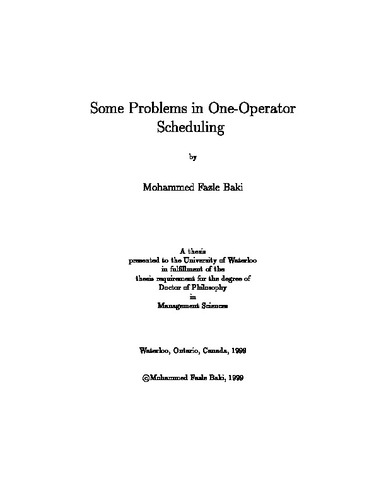| dc.contributor.author | Baki, Mohammed Fazle | en |
| dc.date.accessioned | 2006-08-22 13:49:28 (GMT) | |
| dc.date.available | 2006-08-22 13:49:28 (GMT) | |
| dc.date.issued | 1999 | en |
| dc.date.submitted | 1999 | en |
| dc.identifier.uri | http://hdl.handle.net/10012/881 | |
| dc.description.abstract | A flexible workforce or a versatile machine is employed to perform various types of operations. Often these resources are associated with setups. Whenever a worker or machine switches from processing one type of operation to another a setup time may be required although several operations of a same type can be processed in succession after a single setup. The presence of setups gives rise to the problem of choosing batch sizes that are neither too large nor too small. In the last one and a half decade, many researchers have addressed the problem of scheduling with batching. A majority of articles assumes that there is only one type of scarce resource, which is typically machine. Often there can be two scarce resources such as a worker and a machine or a machine and a tool. We propose a resource constrained scheduling model with a single operator and two or more machines. Whenever the operator changes machine, a setup time is required that may be sequence dependent or sequence independent. We consider the two cases of an open shop and a flow shop. In the open shop case, the order in which a job visits the machines is unrestricted. In the flow shop case, every job must visit the machines in the same order. We consider various scheduling objectives. For variable number of machines, many cases are intractable. We discuss some dominance properties that narrow down the search for an optimal schedule. We present a dynamic programming approach which solves a large number of cases. The running time of the dynamic program is polynomial for a fixed number of machines. For the case of two machines, we show that the dominance properties have a nice interpretation. We develop some algorithms and justify their use by establishing running times, comparing the running times with those of the existing algorithms, and testing the performance of the algorithms. | en |
| dc.format | application/pdf | en |
| dc.format.extent | 1070454 bytes | |
| dc.format.mimetype | application/pdf | |
| dc.language.iso | en | en |
| dc.publisher | University of Waterloo | en |
| dc.rights | Copyright: 1999,
Baki, Mohammed Fazle . All rights reserved. | en |
| dc.subject | Management | en |
| dc.subject | Scheduling | en |
| dc.subject | Setup times | en |
| dc.subject | Batching | en |
| dc.subject | Polynomial time | en |
| dc.subject | NP-hard | en |
| dc.subject | Resource Constrained | en |
| dc.title | Some Problems in One-Operator Scheduling | en |
| dc.type | Doctoral Thesis | en |
| dc.pending | false | en |
| uws-etd.degree.department | Management Sciences | en |
| uws-etd.degree | Doctor of Philosophy | en |
| uws.typeOfResource | Text | en |
| uws.peerReviewStatus | Unreviewed | en |
| uws.scholarLevel | Graduate | en |

